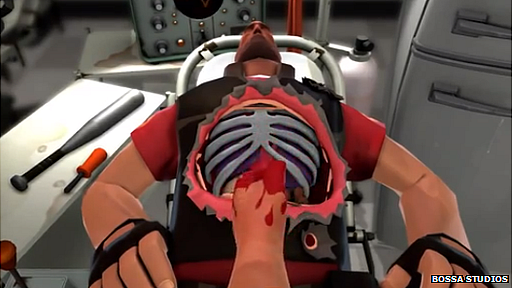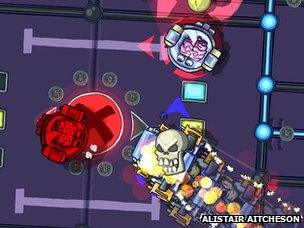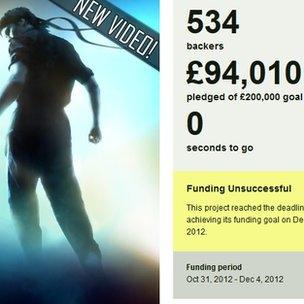Indie video games developers face an uncertain future
- Published

Surgeon Simulator 2013 requires players to complete a heart transplant with inappropriate tools
If you want an object lesson in how the gaming world has changed, then the runaway success of Surgeon Simulator 2013 is probably as good a guide as you are going to get.
Coded in just four days in January by developers from Bossa Games as part of the 2013 Global Game Jam event, it casts the player in the role of a surgeon who has to perform a series of delicate surgical procedures.
The game's gimmick is that the player must carry out these procedures via simulated arms that are clumsy and hard to control. This makes delicate movement impossible and success has more to do with luck and blunt force than skill.
The demo of the game was uploaded to the Game Jam site and proved a big hit. Not only did people want to play it, they took videos of themselves playing and shared them online.
In only a few days the videos had racked up millions of views and the hilarity of the demo was being talked about everywhere online.
"All of a sudden this thing went out of control and we knew we had to move fast," said Henrique Olifiers, co-founder of Bossa during a presentation about Surgeon Simulator at the Develop conference in Brighton. The conference brings together the UK's games makers to talk about how their industry is changing.
For Bossa, moving fast meant pledging to produce an entire Surgeon Simulator game in 48 days and then working very hard on social media to maintain interest in what was supposed to be a spare-time project.
That led to "six figure sales" when the full game emerged and gave Bossa its biggest hit to date.
WATCH: Delegates give their views on the rise of mobile gaming
What is significant about the Surgeon Simulator story is the way that success came about.
"It used to be about who shouted the loudest," said Lee Schuneman, head of Microsoft's Lift London studio. The title with the biggest marketing spend tended to get the biggest audience.
But not any more.
"Now it's about conversations between developers and players and, more importantly, between the players themselves," he said.
"The initial success of a game is down to how it is received by players and how that audience is cared for once it has launched."
Alongside the rise of social media and the growing chatter among gamers about what they play have come structural changes in where and on what people play games.
While blockbuster "AAA" titles are still being made, increasing numbers of people are playing games on mobile devices such as phones, tablets and portable game gadgets.

Games played on portable gadgets are becoming more popular
The relatively limited capabilities of those devices has led to a huge rise in casual games written by independent developers, be they gathered in small studios or working alone.
"The bigger studios are breaking up and there are definitely more indie and smaller studios around now," said Will Freeman, editor of Develop magazine which writes about the UK game developer scene.
"Those smaller studios are great for the creative output of the industry," he said, adding that they tended to take more risks than the larger studios which had become more conservative as the budgets required to make top flight titles grew and grew.
However, he said, that did not mean that indie developers had it easy. In a hit-driven industry, said Mr Freeman, many of them had struggled to prosper because it was hard for them to get noticed and sell enough copies to pay the rent.
Hunting hits
Solo game maker Alistair Aitcheson solved some of those problems by moving in with his parents and using their home as his development HQ. That left him more time to worry about how to get his two titles, Greedy Bankers and Slamjet Stadium, noticed and into the hands of gamers.
"There was a lovely period on the iPhone when it was easier to get exposure," he said. "But that's gone now because there are so many titles out there it's hard to get spotted."

Kickstarter can be a frustrating place to try to raise funds
Good reviews, networking on social media and hard work to get a game in front of potential players can help, said Mr Aitcheson, but there was no doubt that it remained the toughest problem any indie developer had to tackle.
The experience of Kostas Zarifis showed just how tough it can be. Mr Zarifis gave up a good job at the high profile Lionhead Studios to go it alone and bring to fruition a personal project called Kung Fu Superstar.
The game put the player in the position of a martial artist who used real Kung Fu moves to defeat foes in the game world.
A video of what it might look like was a big hit on YouTube and won thousands of "likes" on Facebook. That success led to a Kickstarter campaign that aimed to raise £200,000 to produce a prototype. Sadly, the project was not fully funded.
"We got about half of what we asked for, which was nice, but we needed all of it to get anything," he said. "Liking something on Facebook is not the same as pledging money."
Despite this, he said, he has no regrets about going it alone.
"I stuck to my guns and it paid off in the end," he said. "I do not think there's any scenario where you do this kind of thing and work on something you really believe in that does not pay off in the end."
Mr Zarifis is now doing gaming work on other titles while he looks for ways to get Kung Fu Superstar funded and made.
"I set out to challenge my limits," he said, " and the challenge has not broken me yet."
- Published10 July 2013
- Published7 June 2013
- Published27 May 2013